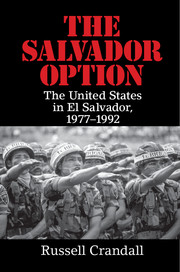Book contents
- Frontmatter
- Dedication
- Epigraph
- Contents
- List of Figures
- List of Organizations
- Acknowledgments
- 1 Introduction
- PART ONE EL SALVADOR IN THE COLD WAR
- PART TWO JIMMY CARTER
- 7 Revolution and Counterinsurgency in Guatemala
- 8 Mass Organizations
- 9 Carter Arrives
- 10 Carter and the Sandinista Revolution in Nicaragua, 1979
- 11 An October Coup
- 12 Carter Engages Salvador
- 13 Archbishop Romero
- 14 Land
- 15 The American Churchwomen
- 16 Arming the Rebels
- 17 Guerrilla Final Offensive, January 1981
- 18 Death Squads
- PART THREE RONALD REAGAN
- PART FOUR GEORGE H. W. BUSH
- PART FIVE POSTWAR
- Notes
- Bibliography
- Index
12 - Carter Engages Salvador
from PART TWO - JIMMY CARTER
Published online by Cambridge University Press: 05 June 2016
- Frontmatter
- Dedication
- Epigraph
- Contents
- List of Figures
- List of Organizations
- Acknowledgments
- 1 Introduction
- PART ONE EL SALVADOR IN THE COLD WAR
- PART TWO JIMMY CARTER
- 7 Revolution and Counterinsurgency in Guatemala
- 8 Mass Organizations
- 9 Carter Arrives
- 10 Carter and the Sandinista Revolution in Nicaragua, 1979
- 11 An October Coup
- 12 Carter Engages Salvador
- 13 Archbishop Romero
- 14 Land
- 15 The American Churchwomen
- 16 Arming the Rebels
- 17 Guerrilla Final Offensive, January 1981
- 18 Death Squads
- PART THREE RONALD REAGAN
- PART FOUR GEORGE H. W. BUSH
- PART FIVE POSTWAR
- Notes
- Bibliography
- Index
Summary
The private sector is in its “final offensive.”…[They are] the biggest threat to the junta.
– José Napoleón Duarte, Junta president, July 1981, referring to conservative businessmen attempting to scuttle land reform and bank nationalization programsThe Carter Option
Given the fear of “another Nicaragua,” the October 1979 coup came as a deep relief to the Carter administration. As ambassador in El Salvador at the time, Frank Devine, stated, “The finest hour that El Salvador had in its memorable history was that coup of October 15, 1979.” Yet, while clearly eager to see General Romero go, declassified cable traffic from San Salvador seeking guidance on how to respond to the coup reveals that American officials had only limited prior knowledge of the putsch. The United States did, however, move quickly to help the new government. State Department spokesman Hodding Carter told the press that the new leaders appeared to be “centrist and moderate” and that the direction they had laid out for the new government was “encouraging.” Ambassador Devine later recounted that the coup members’ program “emphasized the correction of past wrongs, respect for human rights, release of all political prisoners, return of political exiles, and the implementation of a program of thoroughgoing reform of the nation's antiquated economic, social and political structures.” The big threat to America's interests, Devine contended, was that the far left would undermine the new junta. “[It is] increasingly clear that [the] extreme left will continue its violent effort to undermine [the] new junta and at some point [the] very survival of [the] latter might depend on greater outside assistance to cope with these elements.”
Two weeks after the coup, U.S. officials announced that Washington would provide the new government with “significant” military aid as well as moderate amounts of “nonlethal” riot control and military gear as an inducement to get the junta to implement further reforms. However, there was no consensus among the senior officials. Secretary of State Cyrus Vance, for example, feared that greater aid and more training would lead to even higher levels of U.S. involvement, creating a “quagmire effect” similar to what had happened in Vietnam.
- Type
- Chapter
- Information
- The Salvador OptionThe United States in El Salvador, 1977–1992, pp. 132 - 139Publisher: Cambridge University PressPrint publication year: 2016



